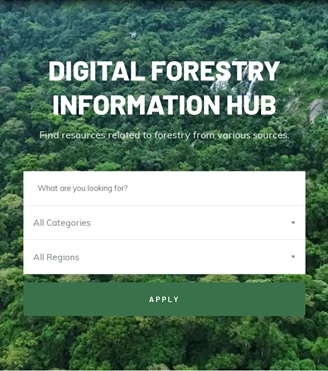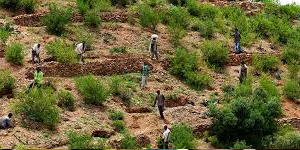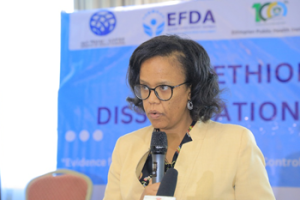
A Digital Forestry Information Hub (DFIH) is a centralized online platform for collecting, managing, and disseminating forestry and forest management data. A hub like this can serve a wide range of stakeholders, including government agencies, researchers, non-governmental organizations (NGOs), forest managers, and the general public.
Furthermore, the Hub plays an important role in modern forest management and conservation. It acts as a central store for a variety of forestry data, such as satellite imaging, forest health evaluations, biodiversity information, and climate data. This accessibility enables stakeholders to make informed decisions.
It improved the executive bodies’ ability to make decisions as well. The Hub uses real-time data and analytics to help researchers, policymakers, and forest managers make evidence-based decisions about land use planning, sustainable management, and forest conservation.
Besides, it encourages cooperation and information exchange between various stakeholders, such as local communities, NGOs, government organizations, and researchers. It makes it easier to exchange best practices and knowledge, which results in more successful forest management plans.
More significantly, it can be utilized as a monitoring and reporting mechanism since it is a forestry platform that frequently has tools for recording changes over time, reporting on sustainability targets, and monitoring forest conditions. This can help mitigate the effects of climate change and is crucial for adhering to environmental standards and evaluating the effects of forestry operations. By offering information on carbon stocks and emissions from forests, the center can help with climate change mitigation initiatives. It aids in understanding the function of forests in global carbon cycles and the development of carbon sequestration techniques.
There are several threats to the world’s biodiversity at the moment. As a result, the hub can offer vital information on biodiversity threats, habitat conditions, and species distribution. Planning for conservation and putting plans into action to save endangered species and habitats depend heavily on this information.
Taking the importance of the Hub into account, the Consortium for Climate Change Ethiopia has established the Digital Forestry Hub (DFIH) in collaboration with various stakeholders for the first time in the country’s history. This Hub is intended to facilitate the collection and organization of relevant materials useful to decision-makers, experts, CSOs, and development workers in the forestry sector by providing access to digital materials such as training manuals, handbooks, reference books, best practices, videos, and toolkits.
According to Consortium for Climate Change Ethiopia Executive Director Yonas Gebru, while different organizations develop websites at different periods, these websites are not full-fledged and do not organize all of the material in an easy-to-access way for the user. As a result, this website may be easily available to the user by aggregating all of the work done in various locations in the field of forestry.
The website, he continued, is organized into ten categories: sustainable forest management, forest ecology, wildlife and biodiversity, restoration of degraded land and soil and water management, wood science and technologies, policy and governance, forest economics, forest health, and fire, research, education, and extension, climate change adaptation and mitigation, and international forestry.
This helps in informing, educating, and making available the work done around forests and forestry not just nationally, but also on a continental and international scale. In particular, it supports the coordination of studies and research projects aimed at preventing climate change and protecting the environment, he noted.
Kotebe Education University Biology Department Plant Ecology and Biodiversity Management Lecture Dr. Metsehet Yinebeb said that various forestry research has been and is being conducted at the national and international levels. However, older research and publications are difficult to obtain, while newer research requires a price.
As a result, developing this Digital Forestry Information Hub makes data accessible to individuals, government organizations, the public, and different research institutions. These, in turn, assist students and researchers in determining the topic of their research, funders to identify projects and locations, and individuals and institutions to know about the current state of forestry in the country.
In addition, the country is working on forestation and afforestation activities including the Green Legacy Initiative. As a result, the Hub is critical for understanding what work is being done, indicating what data is accessible, what is lacking, and how to tackle forest and forest-related problems. It is also important to provide available data to all segments of society, she added.
The Hub also provides data on when, where and how is gathered and shared, as well as unexplored study areas for people and organizations interested in doing forest research. It also helps in finding any gaps in the forest-related projects already underway. Therefore, she said, it is essential to bolster the Hub with diverse data to carry out quality research projects as well as to guarantee the ongoing data flow and linkage with future generations.
Addis Ababa University Law Department Environmental Protection Lecturer Dr. Mellese Damtie said that despite national and international conventions and agreements pertaining to biodiversity utilization, it is noted that individuals and companies unlawfully take away the nation’s forest biodiversity resources.
As a result, building and making the Hub available to users is critical for distinguishing the country’s biodiversity from other countries, assisting the country in obtaining benefits, and enforcing its legal rights.
He emphasized that this Digital Forestry Information Hub should be updated regularly with new data and research, as well as forest preservation projects on both large and local scales. This, in turn, prevents any individual or group from illegally taking out the country’s biodiversity. As a result, the country is better equipped to combat bio-piracy, he added.
Indeed, this Digital Forestry Information Hub can be used as an instructional resource for forestry professionals, students, and the general public to raise awareness of sustainable practices and the value of forests to Ethiopia’s environment and society. It is also critical for developing sustainable forestry practices, improving stakeholder collaboration, and tackling climate change and biodiversity loss. Its role in providing accessible information and encouraging innovation is critical to the future of forest management.
Therefore, to strengthen the Hub using current and reliable data, all stakeholders should be committed and show collaboration. In addition to giving the country forest data, the Hub also stops unlawful activities like bio-piracy and ensures that its forest resources are used responsibly.
BY EPHREM ANDARGACHEW
THE ETHIOPIAN HERALD SUNDAY EDITION 29 DECEMBER 2024





